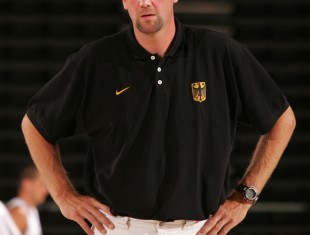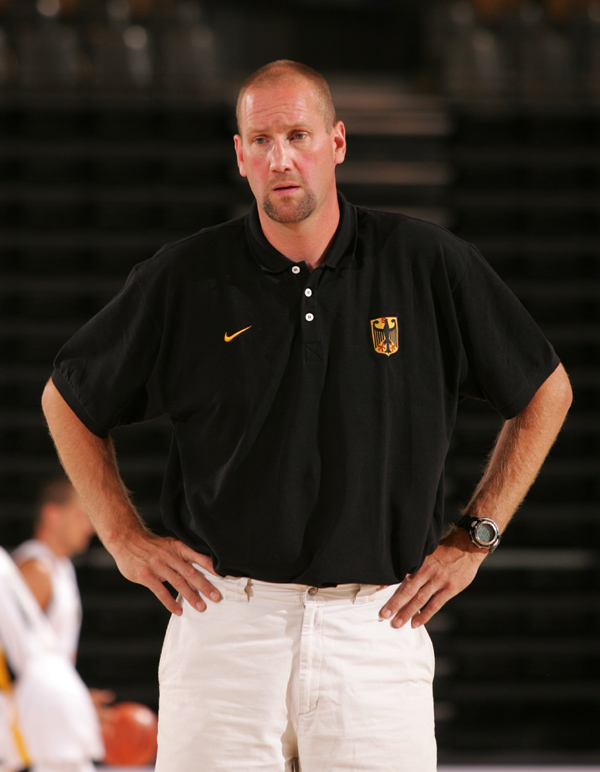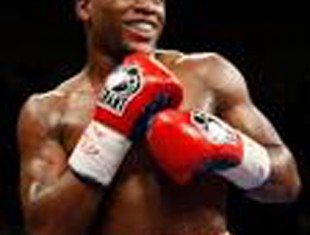Editor’s Note: Chris Well, the 7-foot exchange student from Germany who led Olympic High School to the 1983 state AA championship, has died of an apparent heart attack at his vacation home on Hood Canal. I covered Welp when he played for Olympic and during the four years he played for Washington, helping the Huskies to two Pac-10 championships and to the NCAA Tournament three times. He is is Washington’s all-time career leader with 2,073 points, field goals made with 820 and blocked shots with 186. He also is fourth all-time in rebounds with 995. Al Gleich, who was the assistant coach to head coach Howard Thoemke at Olympic in 1983, sent an e-mail to me tonight. Here is part of what Gleich wrote: “I had the pleasure of sitting with Chris, his son Nick and Dave Harshman (Marv Harshman’s son), watching Chris’ son Colin play for Seattle Prep in a regional game Friday night. Colin had a great game and Seattle Prep defeated Lincoln High School to advance to the state tournament (final eight). We had a great time and Chris was so proud of his sons and just really enjoyed watching Colin play basketball. Let’s all keep Chris and his family in our prayers.” When I interview Chris in 2006 for the story below about the 1983 Olympic team nine years ago, the always humble Welp, who was without an ego, was quick to think of others. The first thing I asked him was, “What is the first thing that pops into your mind” And he replied without a second’s delay, “I was thinking I haven’t seen Joe Asberry.” Asberry, of course, was the second-leading scorer for the Trojans behind Welp on that 1983 champion team. Later in the interview, Chris said he felt bad that he had overshadowed Asberry and said, “I probably took the spotlight away from Joe Asberry, who would have had a great seaosn if I hadn’t been there.” he said. Welp lived with Dr. Jim Hansel and his wife Jean while he was her, and Chris always felt like they were his family. It’s a terrible loss that the whole region has suffered with his death. Prayers go out to his family.
Chris Welp, coaching a Germany team in 2006
By Terry Mosher
Editor, Sports Paper
There was a time when a German invasion had nothing to do with World War II. Although – in this case – a war of sorts was also involved.
This was back in the 1982-93 basketball season when a German student named Christian Welp showed up at Olympic High School several weeks after school had started. Welp was one of numberous German students who filtered into our state at about this time, but his arrival stirred up more controversy than the others.
Some of the invading Germans were athletically gifted, especially in basketball – and tall. Welp stood 6-foot-11 3/4, but was passed off as a 7-footer in the many stories that would eventually be written about him as he moved from Olympic HS to the University of Washington and to the NBA.
If Welp was just tall, the controversy that would follow him and the Oly Trojans that year would not have happened. But Welp was an experienced German club basketball player and his presence on an Oly team that would have been very good without him created waves that still to this day ripple.
With Welp and 6-5 Joe Asberry leading the Trojans, the school that sits halfway between Bremerton and Silverdale by the county fairgrounds swept into the state AA championship game at the Seattle Coliseum where it engaged in a weird night of basketball with Centralia and its longtime coach Ron Brown that wasn’t decided until four overtimes later.
In the end, Welp and the Trojans – coached by Howard Thoemke – prevailed 54-51 on that March 12th day in 1983, giving West Sound its last state high school boys basketball championship.
Prior to the Trojans title, East High of Bremerton won back-to-back AA titles in 1973-74, guided by legendary coach Les Eathorne and prep All-American Rick Walker, now the boys coach at King’s West.
Central Kitsap, coached by Bob Moawad and led on the floor by its All-State player Don Thorsen won the state AA championship in 1969.
Ty Stephens coached South Kitsap to the 1950 A (big school) title and legendary coach Ken Wills led his 1941 Bremerton team to the A championship (Les Eathorne was a junior on that team; Wills and Eathorne just missed another championship the following year when Hoquiam beat them 36-34, and Wills had his 1946 and 1948 teams in the title game as well).
So boys championships have been rare for West Sound high schools – South Kitsap is a serious contender this year – and might even have been rarer if Welp had not shown up in the fall of 1982.
The stories of how Welp got here are many. To this day, it still upsets the people who continue to believe he was recruited to Olympic. Mark Morris coach Dave Denny was especially upset – his Monarchs had to play all three teams with Germans that year, Sehome, Centralia and Olympic, losing to all three – and he apparently led the charge to a Washington Interscholastic Activities Association rule change the following school year that exchange students had to be from sanctioned foreign exchange programs and could not play varsity sports their first year here. Lawyers fought back and the following the one-year rule against varsity participation was rescinded.
Al Gleich – now the girls basketball coach at Olympic HS – was Thoemke’s assistant in 1982-83 and because he had coached for several years in Germany before coming to Olympic it was presumed he had recruited Welp, a charge he denies to this day.
So does Welp.
“I can totally see (the resentment that still exists), sure,” says Welp, who has a summer home in Kitsap county and lives in the Seattle area with his second wife and two young boys. “The thing I have to say for myself is I was not recruited. I could have gone anywhere really.”
In 1981, Welp was on the West German National Junior team that he said Detlef Schremp was coaching. Schremp found out Welp wanted to go to the states. Schremp said there was a host family available near Chicago.
“I wasn’t done with high school in Germany so I told him, ‘No, I will wait,” Welp said. “The following year (1982), he said, ‘I have something for you in Washington state near Seattle.’”
That turned out to be Dr. Jim Hansel, wife Jean and their family in Silverdale. The Hansels had been taking in kids in exchange programs and otherwise over the years and they immediately said yes to Welp.
Schremp had come from West Germany to Centralia for the 1980-81 school year and led Brown’s 1981 Centralia team to the state AA championship, then played four years at Washington (Welp would join him there in the fall of 1983) before beginning a long and productive career in the NBA (3 All-Star teams), most of them with Seattle.
Darrin Branch, a 6-5 starting forward on the championship team, remembers hearing during the summer of 1982 that a 7-foot German exchange student was going to be attending Olympic in the fall.
“Al Gleich had some summer camps for kids from Central Kitsap, Bremerton and Olympic and he started talking about this 7-foot kid who was on the German National Junior Team coming here, and right away you know if he’s on that team he can play – especially being that tall,” said Branch, who lives in Port Orchard.
The year of Welp was a big one for Germans playing basketball in the state. Sehome (Bellingham) had 7-foot Jens Kujawa and Brown had 6-9 Thomas Deuster at Centralia.
Deuster was one of many Germany students who spent a year at Centralia. According to Brown, the school had a superintendent who liked to have exchange teachers come in from other countries and the ones from Germany would go back home and encourage students to spend a year in Centralia. Brown said for about a 10-year period Centralia had German students, both non-athletic and athletic, that showed up just through word-of-mouth.
Two of them, of course, were Schremp and Deuster, who was one of four German students at Centralia in the 1982-83 school year. Deuster stayed with the Browns when he first arrived in Centralia.
Welp even stayed with the Browns while Deuster was there.
“They (Deuster and Welp) knew each other and were often on the phone with each other, so I invited Welp down to spend a weekend,” said Brown, 71, who last month concluded his 45th year as head coach of the Tigers.
The 1982-83 season was a magical ride for the Trojans. They started the season without Welp in the lineup – the Washington Interscholastic Activities Association had declared Welp ineligible because he did not come to the U.S. through a recognized foreign exchange program – but with Asberry scoring 33 points and 6-2 Jarvis Jennings, a transfer from Georgia, adding 19 points the Trojans dumped Spanaway Lake 77-63 in their opener.
Welp made his U.S. debut in the second game. And it was sensational. The big guy scored 28 points and grabbed 28 rebounds as the Trojans jumped all over Bremerton 75-56 in the old East High gym in east Bremerton. After the season, the WIAA would force the Trojans to forfeit the victory because it said Welp at the time was still ineligible.
Victories kept coming for the Trojans. Win number four was a 15-point win over North Kitsap that was closer than the final score indicated. The Vikings would also make the state tournament that year and they would be ready for Welp and Company the next time around.
Olympic League opponents as well as teams out of the league tried all sorts of defenses to stop the Trojan steamroller.
“From the Bremerton game on everybody played a bunch of junk defenses,” said Gleich, “Guys in front of Welp, guys in back of him.”
And Welp couldn’t get a break from the referees, and was often in foul trouble.
“He’d go up for a rebound and come down and bump somebody and they’d call a foul on him,” said Gleich. “It was frustrating to him. He was so big and so good, everybody was out to stop him and he’d have two or three people on him all the time.”
The Trojans rose to the top of the Associated Press state rankings for AA schools, and wins kept coming. But North Kitsap, which had one of the state’s top scorers in 6-4 Tim Heins, loomed large on the horizon.
Veteran Viking coach, Jim Harney, became convinced the way to beat Olympic was to slow the game down. He had the guards to do it in his son, Mike Harney, Mark Johnson and Joey Fulton, who came off the bench.
But there was a problem. His varsity players didn’t like the idea of going to a four-corner offense. So Harney had his junior varsity run four-corners against his varsity. The varsity quickly changed their minds.
The slow-down almost worked. Olympic survived 37-36, winning it’s 11th straight game while University of Washington coach Marv Harshman watched the game at the North Kitsap gym. Harshman had signed Welp to a national letter of intent – sight unseen – even before the prep season had begun, solely on the recommendation of Schremp who was then a sophomore starter for the Huskies.
Olympic surged on to a 15-0 record and maintained its No. 1 state ranking. But North Kitsap loomed again. Before another packed gym in Poulsbo, the Viking four-corner offense would succeed, 50-37.
Down, but not out, the Trojans bounced back to finish the regular season 19-1 with a No. 2 state ranking behind Bellingham, which suffered its only regular-season loss to Bremerton.
The Trojans whipped Washington for the district title to advance to the regional tournament at St. Martin’s College where Denny and his Mark Morris Monarchs were plotting a surprise.
Denny, upset with the presence of Welp and other Germans playing on state teams, practiced a keep-away game all week in practices. His Monarchs, despite falling behind from the start, stood at half-court and passed the ball between themselves while the Trojans stayed back in a tight 2-3 zone. Denny’s plan was to be within four points with four minutes left and then try to win it from there.
Never happened. The Trojans led 8-2 at halftime and 10-4 after three quarters. And when the time came to really play, the Trojans were ready and cruised to an 18-10 victory that produced the lowest score in a state post-season game.
Denny’s Monarchs would be ousted from postseason the next night by Sehome and Kujawa.
Mount Rainier drew the Trojans in the first round of the state tournament and when told what team he had to play, coach Karl Cordes quipped to the Seattle P-I, “I’m going home and get out my chainsaw.”
It didn’t do any good. The Trojans beat the Rams 73-50 as Welp pumped in 32 points and tied a tournament record with 26 rebounds. Then the Trojans stopped the Black Hawks of Cheney 50-32 with Welp scoring 31 to advance against Brown, Deuster and Centralia for the championship.
The Olympic-Centralia matchup was the second championship game at the Seattle Coliseum that night. The first game pitted Walla Walla and Garfield against each other in a battle that went into two overtimes before Garfield emerged the winner, 44-42.
While that battle raged on, the Trojans tried to stay calm.
“We were lined up and waiting in the tunnel to go out and play and then with four seconds left and the game tied, we went back into the lockerroom,” said Branch. “So Howard gave another speech and about 25 minutes later an assistant came in and said there’s a minute left, let’s go. So we go out, line up and get ready to go out and it goes into another overtime.”
Thoemke kept giving speeches and Branch said he, like his teammates, got more nervous and more butterflies in the pit of their stomachs. Finally, at about 8:30 the first game ended and the Trojans took the floor to make history.
But it took four extra periods. Regulation ended in a 49-49 tie and the first three overtimes were scoreless as Brown sent his team into a stall, looking to make the last shot in each of the overtimes.
Centralia, which played most of the game without Deuster, who had gotten into early foul trouble, took the lead in the fourth overtime when 6-3 Richard Stoszek scored on a short shot half-way into the extra session. But Welp scored on a putback and salted the game away with three foul shots in the last nine seconds, finishing the night with 20 points and 19 rebounds.
“I remember sitting down after a time out and found myself looking at my watch and it was almost midnight,” Brown remembered of that night. “I said to myself, ‘What am I doing up this late?’”
Brown then quipped, “I remember it all. The pain and suffering and misery. Nah, it was a good year. A great year. (The championship game) was a loss for us, a great win for them, a great game for the spectators.”
Branch remembers that the team had to hustle to its bus because the last ferry out of Seattle to Winslow was scheduled for 1 a.m. and it was fast approaching that time.
When the team bus approached Silverdale, Branch said cars and people lined the old two-lane Silverdale Way, honking their horns and flashing their car lights.
“It was amazing, kind of neat,” said Branch. “Then they escorted us back to school.”
Welp was named the MVP of the state tournament and made the Associated Press’ all-state team. But he was not invited to play in the all-state games, which puzzles Gleich to this day, although considering the politics that swirled about the issue of foreign students at that time maybe he shouldn’t be.
The team is now scattered. Asberry, who would accept a scholarship to play basketball at Pepperdine, later transferred to Nevada-Reno and now lives in Berlin, Germany, where, ironically, he is coaching club basketball.
Welp’s 15-year-old daughter Allison with his first wife is on her freshman basketball team in Texas. Home in the Seattle area, Welp is coaching both of the young boys – Collin, 7, and Nicholas, 4 – he has had with his second wife.
“The doctors say they could reach six-foot-eight,” Welp says. “I wouldn’t be surprised if they get taller than that.”
Welp is an assistant basketball coach for the German National Team and when he’s not busy with that works for his good friend, Tim Burnham, a former UW football player, in his construction supply company. He also keeps tabs on Dirk Nowitzki of the Dallas Mavericks, visiting him occasionally. Nowitzki is the heart and soul of the German National Team and even though Mavs owner Mark Cuban doesn’t want Nowitzki to play for the national team, Nowitzki has assured Welp he will.
Welp also makes frequent visits to the Hansels, who consider him part of their family.
“He’s my boy,” says Jean Hansel. “When he first came here, he got out of the car, walked up to the porch, hugged me and said, ‘Hi, mom’.”
Welp captured Jean Hansel’s heart that fall day in 1982, just as he captivated thousands of West Sound basketball fans during the magical basketball season that followed.
“Big people step up in big games and Chris certainly did,” Branch says. “Chris wanted the ball in that game.”
Time has dulled the complaints about the German transfers, and Brown has no complaints. He said it was a mistake for the WIAA to change the rule to hindered the flow of foreign exchange students – Welp calls the rule change “The Welp-Deuster Rule” – and was happy that they quickly rescinded it.




